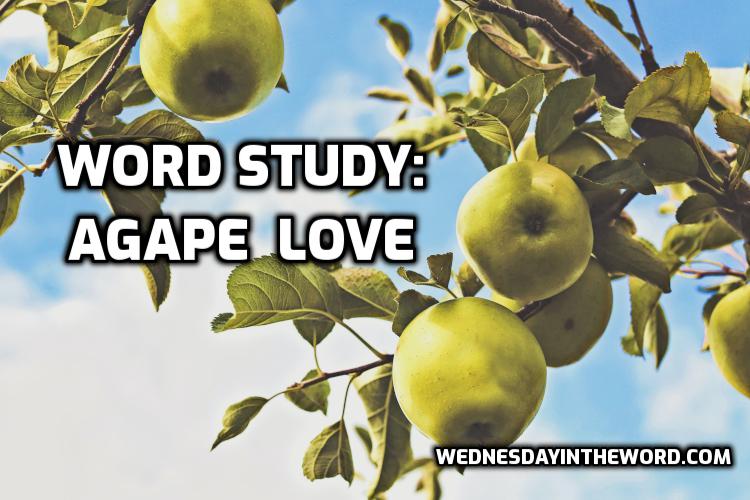Love is the greatest force.
agape is used 116 times in the NT
Think of the love a parent has for their child. Love wants their children to flourish. Love does not give a child merely what they want, because agape love gives the child what they know they need.
Let’s look at how the Bible describes love, and then we will see a few ways in which God is the essence of love. “Love is patient, love is kind. It does not envy, it does not boast, it is not proud. It is not rude, it is not self-seeking, it is not easily angered, it keeps no record of wrongs. Love does not delight in evil but rejoices with the truth. It always protects, always trusts, always hopes, always perseveres. Love never fails” (1 Corinthians 13:4-8a). This is God’s description of love, and because God is love (1 John 4:8), this is what He is like.
In love, God does not force Himself on anyone. Those who come to Him do so in response to His love. In love, God shows kindness to all. In love, Jesus went about doing good to everyone without partiality. In love, Jesus did not covet what others had, living a humble life without complaining. In love, Jesus did not brag about who He was in the flesh, although He could have overpowered anyone He ever came in contact with. In love, Jesus willingly obeyed His Father in heaven. “The world must learn that I love the Father and that I do exactly what my Father has commanded me” (John 14:31). In love, Jesus was/is always looking out for the interests of others.
The greatest expression of God’s love is communicated to us in John 3:16: “For God so loved the world that he gave his one and only Son, that whoever believes in him shall not perish but have eternal life.” Romans 5:8 proclaims the same message: “But God demonstrates his own love for us in this: While we were still sinners, Christ died for us.” We can see from these verses that it is God’s greatest desire that we join Him in His eternal home, heaven. He has made the way possible by paying the price for our sins. He loves us because He chose to as an act of His will. Love forgives. “If we confess our sins, he is faithful and just and will forgive us our sins and purify us from all unrighteousness” (1 John 1:9).
So, what does it mean that God is love?
Love is an attribute of God. Love is a core aspect of
God’s character, His Person.
God’s love is in no sense in conflict with His holiness, righteousness, justice, or even His wrath. All of God’s attributes are in perfect harmony. Everything God does is loving, just as everything He does is just and right. God is the perfect example of true love. Amazingly, God has given those who receive His Son Jesus as their personal Savior the ability to love as He does, through the power of the Holy Spirit (John 1:12; 1 John 3:1, 23-24).
First Corinthians 13:13 says,
“And now these three remain: faith, hope and love.
But the greatest of these is love.”
This comes just after Paul’s eloquent and famous description of what
true love--agape love—is.
There are several ways in which love can be said to be the greatest.
First Corinthians 13:13 lists love along with faith and hope as a gift that lasts forever. The lasting nature of faith, hope, and love make them greater than all other gifts of the Spirit, which are temporary; the gifts of prophecy, tongues, and knowledge are mentioned in 1 Corinthians 13:8 as coming to an end. Of the three “forever gifts,” love is the greatest.
Love is greater than faith and hope in that both faith and hope depend on love for their existence. Without love, there can be no true faith; a loveless faith is nothing but an empty religious exercise. As Paul says, “If I have a faith that can move mountains, but do not have love, I am nothing” (1 Corinthians 13:2). Without love, there can be no genuine hope; a loveless hope is an oxymoron, because we can’t truly hope for something that we do not love. Faith and hope are dead, sterile things if not accompanied by love.
One of the reasons that love is the greatest gift is that it is essential to God’s nature. First John 4:8 tells us that God is love. The book of John and John’s three letters are replete with the theme of love. God gives us His love, and we reflect that love back to Him: “We love because he first loved us” (1 John 4:19). Jesus said, “As the Father has loved me, so have I loved you. Now remain in my love. If you keep my commands, you will remain in my love, just as I have kept my Father’s commands and remain in his love. I have told you this so that my joy may be in you and that your joy may be complete. My command is this: Love each other as I have loved you. Greater love has no one than this: to lay down one’s life for one’s friends. . . . You did not choose me, but I chose you and appointed you so that you might go and bear fruit—fruit that will last—and so that whatever you ask in my name the Father will give you. This is my command: Love each other” (John 15:9–17). Here we see that love is something that has always existed among the persons of the Trinity. Love has no beginning and does not end. And this is the love into which we are invited. Jesus desired for future believers to be part of His love as well: “I have made you known to them, and will continue to make you known in order that the love you have for me may be in them and that I myself may be in them” (John 17:26).
Jesus taught that the greatest two commandments both include love, the greatest gift: “‘Love the Lord your God with all your heart and with all your soul and with all your mind.’ This is the first and greatest commandment. And the second is like it: ‘Love your neighbor as yourself.’ All the Law and the Prophets hang on these two commandments” (Matthew 22:37–40).
John Calvin puts forward a very simple reason why love is the greatest gift: “Because faith and hope are our own: love is diffused among others.” In other words, faith and hope benefit the possessor, but love always benefits another. In John 13:34–35 Jesus says, “A new command I give you: Love one another. As I have loved you, so you must love one another. By this everyone will know that you are my disciples, if you love one another.” Love always requires an “other” as an object; love cannot remain within itself, and that is part of what makes love the greatest gift.
1. Truth aims at love
''The goal of our instruction is love from a pure heart and a good conscience and a sincere faith"
(1 Timothy 1:5).
Note: instruction is not the goal, love is. Instruction is the means. It is subordinate. Truth serves love. Education serves relationships - mainly the relationship between us and God, but also between Christian and Christian, and between us and unbelievers. The "goal" of all our education is love.
"Let us hold fast the confession of our hope without wavering, for He who promised is faithful; and let us consider one another how to stir up to love and good deeds, . . . encouraging one another" (Hebrews 10:23-25, literal translation). The aim of our "considering one another" and "encouraging one another" is that we stir up love. We mingle insight into "the confession of our hope" with insight into "each other," and the effect is stirring each other to love. The truth of doctrine and truth of people-watching unite to aim at love.
2. Love aims at truth
''Love does not rejoice in unrighteousness, but rejoices with the truth" (1 Corinthians 13:6). Love is glad when truth is spoken. Therefore love aims at truth. It supports truth.
"Out of much affliction and anguish of heart I wrote to you with many tears; not so that you would be made sorrowful, but that you might know the love which I have especially for you" (2 Corinthians 2:4). Here is an example of how love aims at truth. Paul is filled with love and it compels him to write a letter that was hard, and caused sorrow in him and in the Corinthians. But it needed to be said. So love said it. Love speaks the truth personally and doctrinally.
3. Love shapes how to speak the truth
"'Speaking the truth in love, we are to grow up in all aspects into Him who is the head, even Christ" (Ephesians 4:15). There is an unloving way to speak the truth. That kind of truth-speaking we should repudiate. But there is a way to speak the truth in love, and that we should seek. It is not always a soft way to speak, or Jesus would have to be accused of lack of love in dealing with some folks in the Gospels. But it does ask about what is the most helpful thing to say when everything is considered. Sometimes what would have been a hard word to one group is a needed act of love to another group, and not a wrong to the group addressed. But in general, love shapes truth into words and ways that are patient and gentle (2 Timothy 2:24-25).
4. Truth shapes how to show love.
"By this we know that we love the children of God, when we love God and observe His commandments. For this is the love of God, that we keep His commandments; and His commandments are not burdensome" (1 John 5:2). It is not always obvious which acts are loving. So John tells us some truth will help us know if our acts are loving. One truth test for our love is whether we are keeping the commandments of God toward people, In other words, love cannot be cut loose from the truth of God's will.
Truth shapes how to show love.
Love is core to God’s character
and central to the Christian life.
The law of Christ
is to love God and love others.
Love infuses all that God does and should infuse all that we do.
"Love never fails ”
(1 Corinthians 13:8), and it will never cease.
Because of this, love is greater than even hope and faith.




 RSS Feed
RSS Feed





















































